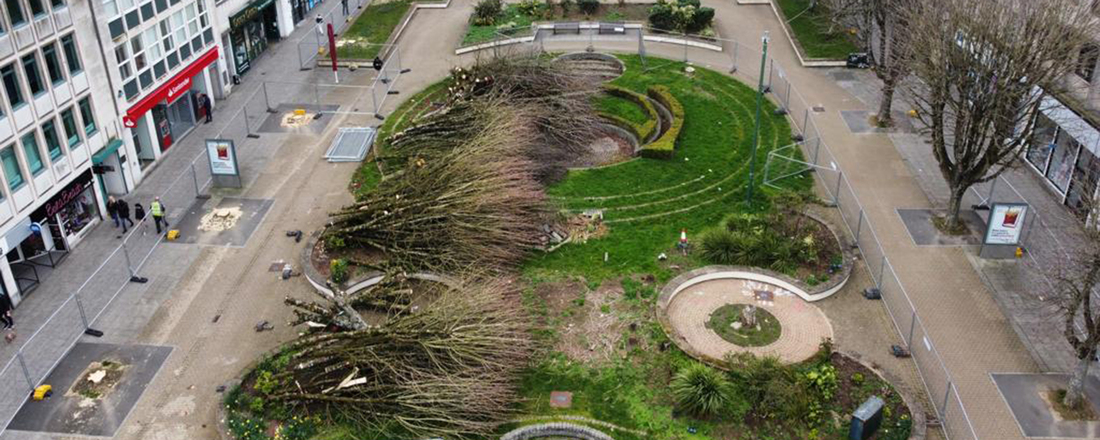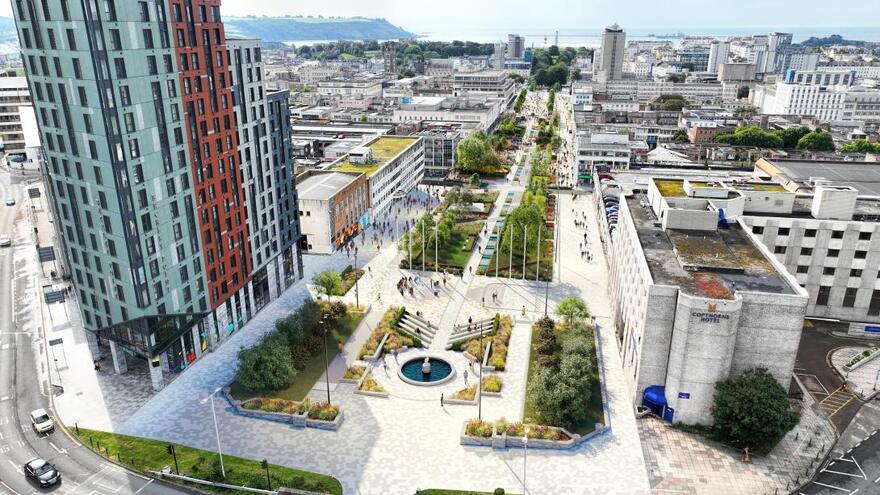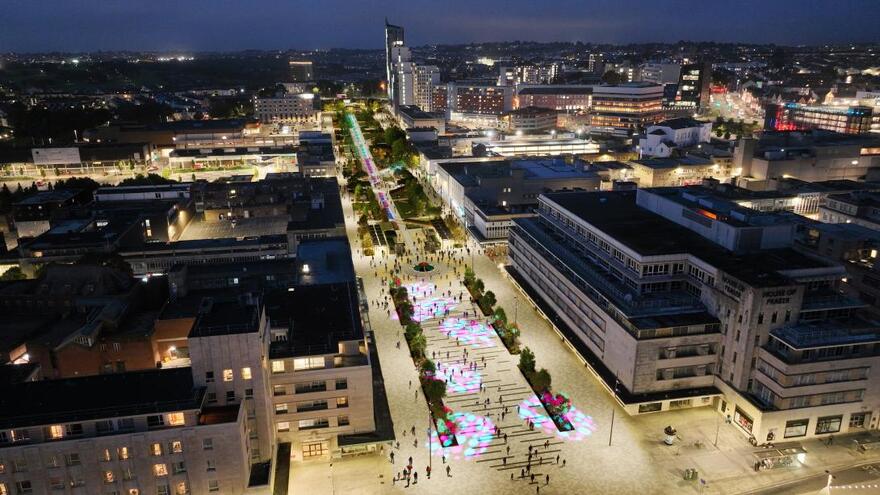Get updates from The Developer straight to your inbox Yes, please!
No leaf unturned: Plymouth tree-felling will face scrutiny with fresh investigation
An independent review will look into Plymouth City Council’s decision to chop down over 100 trees at night. Can it get to the heart of what went wrong? Ella Jessel reports

P lymouth’s infamous tree-felling fiasco will face further scrutiny with the launch of a new investigation into why more than 100 trees in central Plymouth were cut down under cover of darkness to make way for an urban park project.
Running for the next three months, the council-commissioned ‘independent learning review’ will investigate the decision taken by Plymouth City Council’s former Conservative administration to cut down 129 trees on Armada Way, the main thoroughfare, in March 2023.
The controversial action by the authority, now run by Labour, drew national condemnation and led to a legal battle with action group Save the Armada Way Trees (STRAW), a group of campaigners whose last-minute injunction called off the chainsaws at 1am, sparing 16 trees from the so-called “midnight massacre” on the South coast.
But in a blow for STRAW, a judicial review into the former council’s decision was dismissed. The judge ruled the case was “academic” given the redevelopment had already been scrapped by the newly-elected Labour administration, and the trees could not be reinstated.
At the time, the council said the felling took place at night for “reasons of public safety and impact on the city centre”. But during the legal process, meeting transcripts and documents were released that revealed the operation had been planned days before the executive decision was signed
The council is keen to draw a line under the debacle, having since started work on a new £30 million scheme for Armada Way, which it describes as the “largest single public realm project” in the country.
But while the council is keen to move on, the review may serve to reopen the debate. Public trust has been dented further after information released during the legal proceedings revealed worrying details about how the felling operation was planned.
The tree row was top of the political agenda when Tudor Evans was elected as Labour leader of Plymouth City Council in May 2023. He quickly sent the £12.7 million scheme back to the drawing board. Later that year, plans for a similar project were produced that would “recapture the scale and grandeur of Armada Way”, and improve the link from the city centre to the sea.
Armada Way 2.0 is a £30m revamp that includes 202 trees, new seating and a large “play village”. The trees that were saved from felling will be retained apart from four that will be replanted under the plans, which were drawn up by Studio Agora, the same architect as the previous project.
The new urban park also includes a cycle path and a new surface water drainage system partly powered by solar panels that will recycle water to maintain the plants and trees.
After he took office, Cllr Evans also announced an independent review into the tree felling, which got underway last month. Led by a panel of local government figures, the review will accept representations from members of the public, businesses and interested organisations.
“We are aware of the sensitivities around the felling of the trees on Armada Way and over the next three months will be looking at a raft of information,” said its chair David Williams, former chief executive of Portsmouth City Council.
The investigation will look at what led to the original felling decision and what lessons could be learned, “particularly in relation to governance, decision-making and the management of the original scheme”. But the review will not consider the legality of the decision and the terms of reference state that while the council is committed to organisational change through learning and improvement, the review will not seek to “allocate blame”.
STRAW’s lawyers argued that the council had acted unlawfully on a number of grounds, including the decision to bypass challenges from other councillors (known as ‘call-ins’) by using an urgency procedure
The investigation is a rare move, according to Emma Montlake, joint executive director at national charity the Environmental Law Foundation (ELF), who has worked on numerous tree felling cases. “As long as local people are front and centre, and it is not only interviewing officers, it could be a very important step”, she said.
STRAW founder Ali White intends on giving an interview to the panel, but says she is concerned it could be a “whitewash”, given the lack of any definitive ruling on whether or not the council acted lawfully – what the judicial review had hoped to achieve. STRAW’s lawyers argued that the council had acted unlawfully on a number of grounds, including the decision to bypass challenges from other councillors (known as ‘call-ins’) by using an urgency procedure; the failure to decide if an Environmental Impact Assessment screening was required; and the failure to consider the felling’s impact on nesting birds.
Alice Goodenough, partner at Goodenough Ring solicitors, which represented STRAW in the case, said: “Plymouth City Council has never given any public acknowledgement they have done anything unlawful.”
She added: “This was why the group went to such great lengths to pursue the judicial review, because currently there is no legal barrier to prevent councils using this approach as a blueprint for implementing unpopular and unlawful decisions that result in irreversible environmental harm.”
Goodenough says the way the decision was taken was “highly problematic” from a democratic point of view. “The use of the urgency procedure, lack of scrutiny, the secrecy around the decision itself and above all the immediate implementation of the felling at night, impeded access to the appropriate means of challenge – through the courts.”
At the time, the council said the felling took place at night for “reasons of public safety and impact on the city centre”. But during the legal process, meeting transcripts and documents were released that revealed the operation had been planned, days before the executive decision was signed by former leader Cllr Bingley, with a focus on avoiding protests.
Officers even discussed the potential that protesters could leave a “suspect package”, if a no-fly zone was needed around the compound to stop protesters filming, and the “irony” of Plymouth City Council hosting a climate change conference in a nearby hotel while the felling took place. According to Goodenough, the council has claimed there was a risk of direct action from protesters but produced no evidence to support this.
Goodenough said the council had “whipped themselves” into a state of hysteria, and even carried out surveillance on Plymouth residents who they believed were connected to STRAW, handing over a number of ‘intel packages’ to the Police. After this information was disclosed through a subject access request submitted to the council by STRAW, Goodenough submitted a complaint to the Information Commissioner.
The Developer asked the council about the surveillance and “intel packages”, as well as the claims it had acted unlawfully but the authority declined to comment, citing the ongoing review. A spokesperson said the review’s report would be made public.
Montlake says that in such circumstances, councils can easily slip easily into a “siege mentality”, and Plymouth clearly hadn’t learned any lessons from Sheffield, where the city council went to war with its own residents over its decision to fell thousands of healthy trees between 2014 and 2018.
Sheffield City Council was later found by an independent inquiry to have behaved dishonestly. During that process, the Council set its intention from the start for “truth and reconciliation”, and tree campaigners received full apologies from the council for the impact the dispute had on the city and residents.
But in Plymouth, the two sides remain firmly entrenched. In a statement from Evans from November – the most recent – he said it was time to move on and expressed “frustration” that over the past year, White and STRAW have continued to challenge the felling through the courts: “Each time they have been unsuccessful in their legal action. Each time it has cost the taxpayer thousands of pounds”, he said, adding: “Since the start of this process, we have been clear that it was never in the city’s best interests to argue the rights and wrongs of a decision that was subsequently scrapped.”
White says the new leadership has simply defended the work of its Conservative predecessors. “The continued attack on residents and the public is so unhelpful, and the councils should focus on learning lessons and rebuilding trust,” she said.
If you love what we do, support us
Ask your organisation to become a member, buy tickets to our events or support us on Patreon
Sign up to our newsletter
Get updates from The Developer straight to your inbox
Thanks to our organisation members
© Festival of Place - Tweak Ltd., 124 City Road, London, EC1V 2NX. Tel: 020 3326 7238
© Festival of Place - Tweak Ltd., 124 City Road, London, EC1V 2NX. Tel: 020 3326 7238




